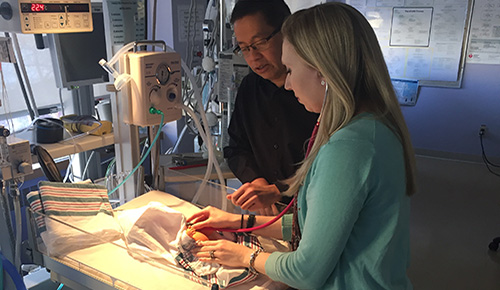
Sam Wong introduces residents, like Erin Boschee, to a medical career in the North.
Sam Wong finds the challenges of pediatric practice in Yellowknife rewarding. "I'm the neonatologist, I'm the intensivist, I'm the endocrinologist, I'm the cardiologist until they actually arrive and do clinics," says Wong, about the unique variety of rural pediatrics. "In one day you'll have a GI patient, you'll have a cardiology consult, and you'll have behavioural issues that you have to deal with."
Erin Boschee began her Yellowknife third-year residency rotation with Wong in March 2017. She agrees it has been valuable to have the chance to experience and understand the triaging and managerial skills that are necessary in a northern rural pediatric practice.
Wong began his own Yellowknife rotation during his 1999 University of Alberta general pediatrics residency. He remains drawn to rural communities, and Indigenous communities in particular. "The practice I have is part based in Edmonton, part based in Yellowknife. I work with three different distinct First Nations and Inuit populations of the Denè and the Cree in Northern Alberta and the Inuit in Nunavut … and I see patients on occasion from the Metis population in Northern Alberta."
Rural populations bring Wong face-to-face with social issues like poverty, obesity and access to care, especially for mental health. "Access to care is really hard," says Wong. "If you live in a community that has no drive-in access, like the majority of the communities in Nunavut, you're not going to have access to mental health." It is hard to face such issues and not take on an advocacy role at some level, Wong explains.
"When you work up North," says Wong, "every patient has some issue that you're dealing with. It's not well-baby checkups and well-child checkups. There are a lot of social determinants of health that are problematic up there including overcrowding of houses and poor access to food."
Rural patients inspire Boschee. "Seeing the patient journey to access medical care firsthand has given me a great appreciation for the strength and resiliency of many northern families," she says. That journey requires frequent travel across long distances, isolation from their homes and cultural communities, and limited access to allied health resources.
While there are unique challenges, Wong does not see his work in rural practice as involving personal sacrifice when compared to an urban setting. Far from isolating, he finds Yellowknife socially and culturally vibrant. Wong has formed strong connections with those he serves, having discovered "the sense that you're with these people and you take care of them, that you're part of the community."
Wong and his team now facilitate six residency rotations per year in Yellowknife. Each resident brings challenges and a teaching workload, but Wong insists, "We like having residents there because I think we really enjoy what we do, and if we can convince more people that this is a great career choice, then that's good for all of us."
This story was originally published in the University of Alberta Department of Pediatrics 2016-2017 Year in Review, Working Wonders.